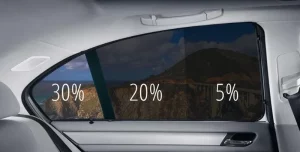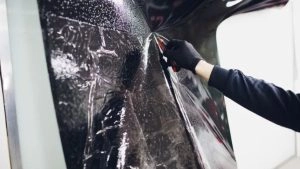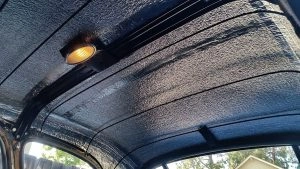Temperatures significantly rise during the summer season, which affects the comfort and overall performance of the car. Fortunately, the impact of heat on the car can be minimized through thermal insulation.
In this article, we will discuss the thermal insulation of cars, and how comfort and performance of the car can be improved through it. We will also clarify the difference between thermal insulation and car tinting.

Thermal Insulation
In the hot summer season, a car can become like an oven with extremely high temperatures. The air temperature inside the car can rise quickly, making it difficult to sit in for long periods. This can cause many problems, including severe fatigue and exposure to harmful ultraviolet rays.
Fortunately, there is a solution to this problem, as a thermal insulator can be installed in the car, which works to reduce the air temperature inside the vehicle, allowing you to sit in the car for long periods without feeling extreme heat.
The Importance of Thermal Insulation for Cars
Thermal insulation for the car is an essential part of maintaining a comfortable driving experience, especially during the hot summer months. However, many people overlook the importance of car thermal insulation, leading to numerous problems.
Firstly, a car that is not well insulated will be extremely hot, which would be uncomfortable for the driver and passengers. This could also result in damage to the interior parts of the car, including the dashboard, seats, and steering wheel.
Secondly, a car that is not thermally insulated can be extremely bothersome, which could distract the driver's focus and lead to fatigue.
Thirdly, thermal insulation can improve the comfort of both the driver and the passengers. Instead of feeling excessive heat inside the car during hot summer days, thermal insulation can reduce the inside temperature of the vehicle, making journeys more enjoyable.
Fourthly, thermal insulation can significantly improve the car's performance. For instance, it can reduce the engine's temperature and help maintain its efficient operation. It can also enhance fuel efficiency and reduce exhaust emissions.
Fifthly, poor car insulation can affect fuel efficiency, as the air conditioning system has to work intensively to cool the car.
The good news is that these issues can be resolved by properly insulating the car thermally. There are many ways to insulate the car, including
Installing heat-reflecting window films
Adding the heat insulation
By insulating your car, you can maintain a comfortable driving experience, reduce noise, and improve fuel consumption efficiency.

The difference between car heat insulation and car tinting.
Have you ever wondered about the difference betweenThermal insulationConcerning car insulation and tinting? If so, you are not alone, as this question occupies many car owners. In the following lines, we will detail the difference between car thermal insulation and car tinting.
What is the thermal insulation for cars?
Thermal InsulatorFor cars, it is a layer of insulating material that is installed between two layers of glass in the side and rear windows of the car.
This insulating layer works to reduce the amount of heat that enters the car, thereby making the air temperature inside it lower.
Also read:Car Paint Care - 7 Methods for Protecting and Polishing the Paint
How does the car's heat insulation work?
The car's thermal insulator works by reducing the absorption of heat from the sun and the hot air that passes through the window, and this depends on the materials used in the thermal insulator.
Some materials have high insulating properties, which allows them to absorb a large amount of heat, while some materials have reflective properties, where heat rays are reflected away from the car.
What are the benefits of thermal insulation for cars?
Thermal insulation for cars offers many benefits, including:
Reducing the air temperature inside the car and making it more comfortable for the passengers.
Reducing the use of the car's air conditioning system, which saves fuel and reduces carbon emissions.
Maintaining the seats and fabrics inside the car in good condition, due to reducing the impact of ultraviolet rays and heat on the materials.
Protecting the car from damage due to exposure to harmful sunlight.
Improve the car's appearance and increase its market value.
What is car tinting?
Car tinting is a process of adding a heat-reflective film to car windows to reduce light and heat penetration. This process utilizes the same materials used in car thermal insulation, but the primary purpose of car tinting is to decrease light and heat.
What is the difference between thermal insulation and car tinting?
Even though heat insulation and car tinting may use the same materials, the primary purpose of each differs. Heat insulation aims to reduce heat permeability to the car and control the car's internal temperature, while car tinting aims to decrease light and heat permeability for better privacy.
Which is better, thermal insulation or car tinting?
The choice between thermal insulation and car tinting depends on the purpose and usage the car owner desires. If the goal is to improve the car's temperature and save on fuel consumption, then thermal insulation is the better option. If the goal is to enhance privacy and protect the car's interior, then car tinting is the ideal choice.

The Conclusion
In this article, we discussed the importance of thermal insulation for cars, which is a crucial factor for enhancing comfort and safety for the passengers, and for improving the car's fuel consumption efficiency. Through the use of thermal barriers, effective and noticeable results can be achieved in improving the car's performance.

Comments